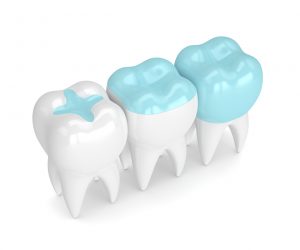LOCATIONS
501 S. Cherry St.
Suite 230
Glendale, CO 80246
Ph: 303-355-6340
6979 S. Holly Circle
Suite 185
Centennial, CO 80112
Ph: 303-355-6340
HOURS
Monday 7:00 am–5:00 pm
Tuesday 7:00 am-5:00 pm
Wednesday. 7:00 am-5:00 pm
Thursday 7:00 am-5:00 pm
Friday 7:00 am-5:00 pm
Dental Sealants


A sealant is a thin, plastic coating applied to the chewing surface of molars, premolars and any deep grooves, sometimes referred to as pits and fissures. Teeth with this condition are hard to clean and are very susceptible to decay which is why more than 75% of dental decay starts in these deep grooves. If a child is prone to decay, sealants can be applied to stop it from getting worse. A sealant can be applied to protect the tooth by sealing the deep grooves and creating a smooth surface that is easy to clean surface. Sealants can protect teeth from decay for many years, but still need to be checked for wear and chipping at routine dental visits.
Guidelines for Sealants
- Children and teenagers – Sealants are usually recommended as soon as the six-year molars (the first permanent back teeth) appear, or any time throughout the cavity prone years of 6-14.
- Adults – Sealants can be applied to tooth surfaces without decay that have deep grooves or depressions.
- Baby teeth – Sealants are done occasionally if teeth have deep grooves or depressions that would make the child prone to cavities.
Sealant Process
The teeth to be sealed are thoroughly cleaned and surrounded with cotton to keep the area dry. An etching solution is applied to the enamel surface of the tooth to help the sealant bond to the teeth. The teeth are then rinsed and dried. The sealant material is carefully painted onto the enamel surface to cover the deep grooves or depressions. Normally the sealant material is hardened with a special curing light. The process takes only a few minutes per tooth.
